"Franz Neumann’s book Behemoth, details how the Nazi regime came about, how you could have this really advanced, highly educated, industrial society suddenly be ruled by this imperialist, vicious regime – how is this possible? And when looking at the ways that the economic elites collaborated, the end result is you have the German establishment supporting Nazism basically as a way to crush any leftists that might want a social revolution or serious reforms to German capitalism."
Aaron Good, author of American Exception
"Day by day the money-masters of America become more aware of their danger, they draw together, they grow more class-conscious, more aggressive. The [first world] war has taught them the possibilities of propaganda; it has accustomed them to the idea of enormous campaigns which sway the minds of millions and make them pliable to any purpose.
American political corruption was the buying up of legislatures and assemblies to keep them from doing the people's will and protecting the people's interests; it was the exploiter entrenching himself in power, it was financial autocracy undermining and destroying political democracy. By the blindness and greed of ruling classes the people have been plunged into infinite misery."
Upton Sinclair, The Brass Check
“A fascist is one whose lust for money or power is combined with such an intensity of intolerance toward those of other races, parties, classes, religions, cultures, regions or nations as to make him ruthless in his use of deceit or violence to attain his ends. They claim to be super-patriots, but they would destroy every liberty guaranteed by the Constitution.”
Henry Wallace
"The totalitarian doctrine of the state thus satisfied the various traditional partisans of German reaction: university professors, bureaucrats, army officers, and big industrialists. It was also acceptable to the western world in general.
Totalitarianism also served the practical needs of the moment. The situation was difficult and Hitler was prompt to use the
weapon of the totalitarian doctrine. The revolution was to proceed
in an orderly fashion—in so far as property, the civil service, and
the army were concerned."
Franz Neumann, Behemoth: The Structure And Practice Of National Socialism 1933-1944
"When humanity, subjugated by the terror of crime, has been driven mad by fear and horror, and when chaos has become the supreme law, then the time for the empire of lawlessness will have come."
Friedrich Rudolf Klein-Rogge, Das Testament des Dr. Mabuse
Stocks were sluggish and weak today, going out near the lows.
We are facing a big week of central Bank interest rate decisions, notably the Fed and ECB, and also the important Non-Farm Payrolls report on Friday.
Gold and silver traded weakly, with silver showing a little bit of upside.
The VIX ticked higher.
The Dollar edged up a bit.
The same jokers who for years have been chanting 'blockchain, blockchain' and '5G,5G' are now intoning 'AI, AI' and 'reverse aging, reverse aging.'
Bread and circuses.
Old as Babylon, and as evil a Faustian bargain as sin.
Have a pleasant evening.




































_Aktion_T4.JPG)































